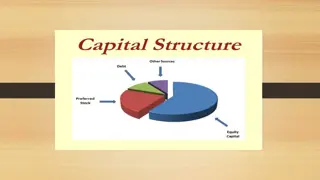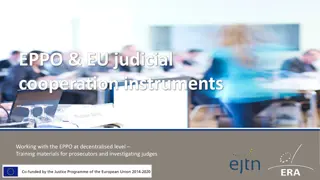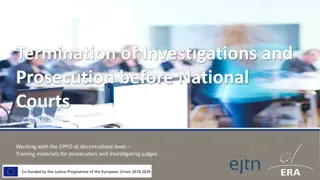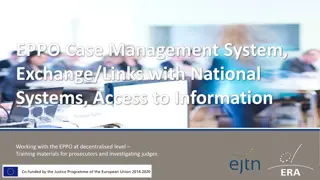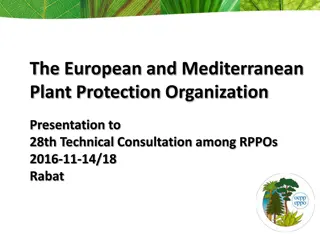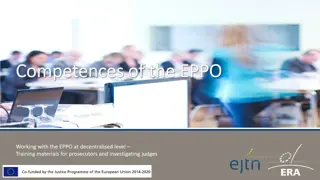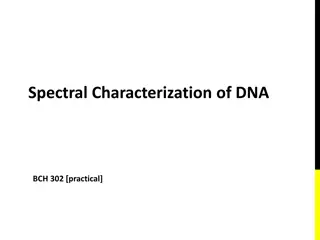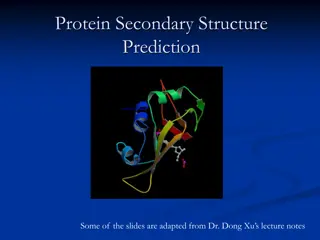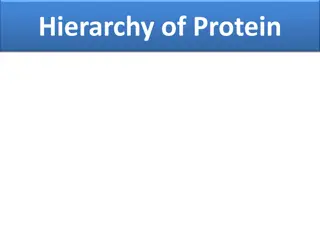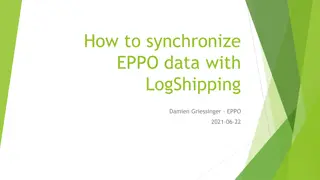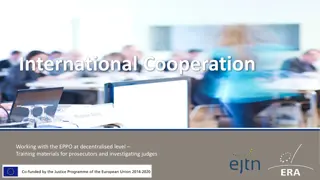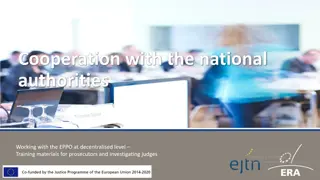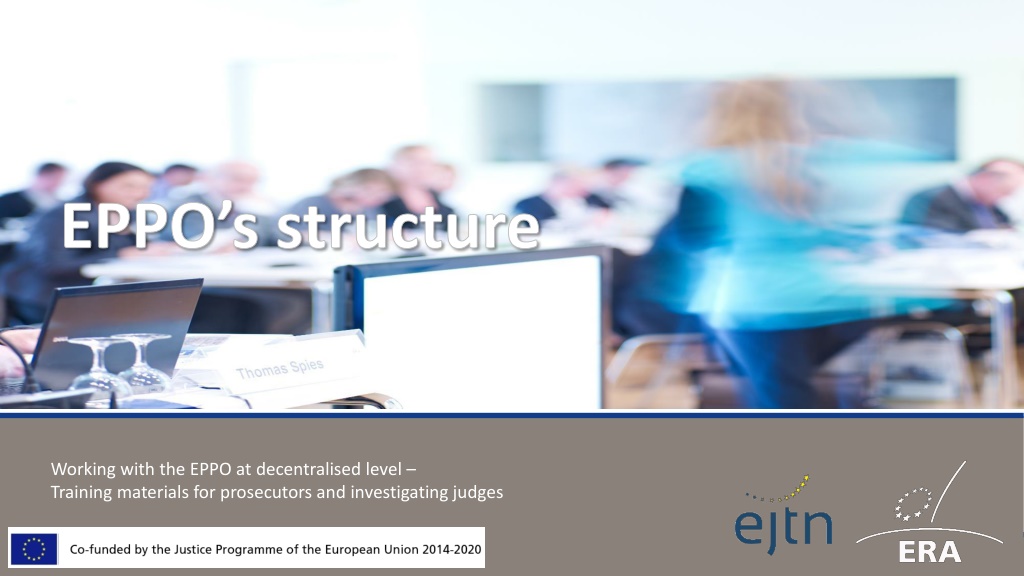
EPPO Structure Overview for Prosecutors and Judges
This comprehensive training material delves into the structure of the European Public Prosecutor's Office (EPPO) at both central and decentralised levels. It covers the key components such as the European Chief Prosecutor, European Prosecutors, Permanent Chambers, European Delegated Prosecutors, and more. The content includes images, a quiz to test knowledge, and details on the EPPO's single office and independence. It highlights the EPPO's unique structure as an indivisible Union body with a decentralised setup, emphasizing its independence, accountability, and operational framework.
Download Presentation

Please find below an Image/Link to download the presentation.
The content on the website is provided AS IS for your information and personal use only. It may not be sold, licensed, or shared on other websites without obtaining consent from the author. Download presentation by click this link. If you encounter any issues during the download, it is possible that the publisher has removed the file from their server.
E N D
Presentation Transcript
EPPOs structure Working with the EPPO at decentralised level Training materials for prosecutors and investigating judges 1
OVERVIEW I. HOW IS THE European Public Prosecutor s Office (EPPO) STRUCTURED? II. THE CENTRAL LEVEL The European Chief Prosecutor (ECP) The European Prosecutors (EPs) The Permanent Chambers I. THE DECENTRALISED LEVEL The European Delegated Prosecutors (EDPs) 2
QUIZ - TEST YOUR KNOWLEDGE HOW IS THE EPPO STRUCTURED? a) As a Union Agency, seated in Luxembourg (similarly to Eurojust in The Hague) b) It is composed of different offices: one in Luxembourg and one in each participating Member State c) It is a single office, organized at two levels: European and national 4
Article 8 Structure of the EPPO 1. The EPPO shall be an indivisible Union body operating as one single Office with a decentralised structure. 2. The EPPO shall be organised at a central level and at a decentralised level. 3. The central level shall consist of a Central Office at the seat of the EPPO. The Central Office shall consist of the College, the Permanent Chambers, the European Chief Prosecutor, the Deputy European Chief Prosecutors, the European Prosecutors and the Administrative Director. 4. The decentralised level shall consist of European Delegated Prosecutors who shall be located in the Member States. 5. The Central Office and the European Delegated Prosecutors shall be assisted by the staff of the EPPO in their duties under this Regulation. 5
EPPO structure: decentralised = double level CENTRAL LEVEL (LUXEMBOURG) EUROPEAN CHIEF PROSECUTOR (ECP) EUROPEAN PROSECUTORS (EPs) (1 per participating MS; with 2 EPs who are DEPUTIES to the ECP) CENTRAL OFFICE ( staff and administrative director) DECENTRALISED LEVEL (MMSS) EUROPEAN DELEGATED PROSECUTORS (EDPS) (at least 2 per participating MS) 6
EPPO structure: single office + independent Article 6 Independence and accountability 1. The EPPO shall be independent. The European Chief Prosecutor, the Deputy European Chief Prosecutors, the European Prosecutors, the European Delegated Prosecutors, the Administrative Director, as well as the staff of the EPPO shall act in the interest of the Union as a whole, as defined by law, and neither seek nor take instructions from any person external to the EPPO, any Member State of the European Union or any institution, body, office or agency of the Union in the performance of their duties under this Regulation. The Member States of the European Union and the institutions, bodies, offices and agencies of the Union shall respect the independence of the EPPO and shall not seek to influence it in the exercise of its tasks. 2. The EPPO shall be accountable to the European Parliament, to the Council and to the Commission for its general activities, and shall issue annual reports in accordance with Article 7. 7
Appointment/Dismissal members EPPOs central office European Chief Prosecutor (Art. 14): Appointment: European Parliament and Council by common accord on the basis of an open call for candidates and a shortlist of qualified candidates submitted by an independent selection panel Dismissal: Court of Justice upon the application of the European Parliament/Council/Commission if no longer able to perform duties or guilty of serious misconduct Deputy European Chief Prosecutors (Art. 15): Appointment and dismissal: by the EPPO college, according to internal rules of procedure European Prosecutors (Art. 16): Appointment: Council after a reasoned opinion of the selection panel from the list of (3) candidates nominated by each Member State Dismissal: Court of Justice upon the application of the EP/council/COM if no longer able to perform duties or guilty of serious misconduct Administrative Director (Art. 18): shall be appointed by the College from a list of candidates proposed by the European Chief Prosecutor following an open selection procedure 8
QUIZ - TEST YOUR KNOWLEDGE Who is the current European Chief Prosecutor? -a - - a K - - - - - Who is the current European Prosecutor from your MS? 10
Laura Kovesi (RO) 7 YEAR TERM. NOT RENEWABLE APPOINTED BY COMMON ACCORD OF THE COUNCIL AND THE EUROPEAN PARLIAMENT 11
EPPO functioning: single office STRATEGY EUROPEAN CHIEF PROSECUTOR : Head of EPPO COLLEGE OF EPs: General oversight/ General isssues & strategic matters OPERATIONS PERMANENT CHAMBERS EUROPEAN DELEGATED PROSECUTORS (EDPs) 12
QUIZ - TEST YOUR KNOWLEDGE The European Chief Prosecutor .. (TRUE OR FALSE) a) is the top of the EPPO hierarchy TRUE b) can be substituted by the Prosecutor General of the MS concerned in case of sickness or absence FALSE c) is the only one allowed to undertake representation tasks FALSE 13
Article 11 The European Chief Prosecutor and the Deputy European Chief Prosecutors 1. The European Chief Prosecutor shall be the Head of the EPPO. The European Chief Prosecutor shall organise the work of the EPPO, direct its activities, and take decisions in accordance with this Regulation and the internal rules of procedure of the EPPO. 2. Two Deputy European Chief Prosecutors shall be appointed to assist the European Chief Prosecutor in the discharge of his/her duties and to act as replacement when he/she is absent or is prevented from attending to those duties. 3. The European Chief Prosecutor shall represent the EPPO vis- -vis the institutions of the Union and of the Member States of the European Union, and third parties. The European Chief Prosecutor may delegate his/her tasks relating to representation to one of the Deputy European Chief Prosecutors or to a European Prosecutor. 14
QUIZ - TEST YOUR KNOWLEDGE The College .. (TRUE OR FALSE) a) will meet once a year and can hold a second extraordinary meeting in August FALSE b) takes operational decisions in on-going cases by simple majority FALSE c) adopts the EPPO internal rules of procedure and sets up permanent chambers TRUE 15
Article 9 The College European Chief Prosecutor (chair) + 1 European Prosecutor per Member State. Meets regularly and is responsible for the general oversight of the activities of the EPPO. Strategic, not operational, organ = can not take operational decisions in individual cases. Recital (24) The College should take decisions on strategic matters, including the priorities and the investigation and prosecution policy of the EPPO, as well as on general issues arising from individual cases, for example regarding the development of a coherent investigation and prosecution policy of the EPPO. Adopts the internal rules of procedure and the Permanent Chambers (proposal by ECP) Decisions by simple majority ( ideally consensus). The ECP has a casting vote if tie. 16
The Permanent Chambers (Article 10) Each chamber has 3 members (2 European Prosecutors + chaired by the European Chief Prosecutor, one of the Deputies or another European Prosecutor) Key operational decision-making powers: monitor and direct investigations by EDPs, ensuring coordination of investigations and prosecutions in cross-border cases operational decisions on individual cases: bring to judgement/dismiss/settle/refer to national authorities/reopen investigations/allocate a case Instruct EDPs to initiate investigations/ exercise the right of evocation/may give instructions to handling EDPs. Decisions by simple majority 17
The European Prosecutors (EPs) Article 12 The European Prosecutor from the EU country concerned supervises the investigations/prosecutions handled by EDPs in his/her MS, on behalf of the Permanent Chamber and in compliance with its decisions/instructions. (including: giving instructions, and providing internal review of their acts if such internal review within the prosecutorial service is foreseen by national law) (Art. 28(4) In exceptional cases approved by the Permanent Chamber may conduct the investigation personally) Present summaries of the cases under their supervision/ proposals for decisions to be taken by the Chamber Function as liaisons and information channels between the Permanent Chambers and the European Delegated Prosecutors 18
QUIZ- TEST YOUR KNOWLEDGE WHO IS THE CURRENT EUROPEAN PROSECUTOR FROM YOUR MS? 19
TEST YOUR KNOWLEDGE How long is the mandate of European Prosecutors? a) They are appointed for 6 years but transitional rules apply for the first mandate period CORRECT ANSWER: A) b) They are always appointed for 6 years and their mandate cannot be extended c) They are always appointed for 6 years and the Council may decide to extend their mandate for a maximum of 3 years at the end of this period 21
European Delegated Prosecutors (EDPs) Article 13 Decentralised level of EPPO: at least 2 per participating country, located in their respective MS where they act on EPPO s behalf Responsible for carrying out investigations and bringing to justice at national level cases under EPPO competence. Includes: operational decisions regarding investigations and prosecutions/ presenting trial pleas and remedies/ participating in taking evidence but no reference to execution phase Integrated in national system: same powers as national prosecutors (in addition or subject to those conferred to them by the Regulation) 23
QUIZ- TEST YOUR KNOWLEDGE The European Delegated Prosecutors .. (TRUE OR FALSE) a) are selected by the European Chief Prosecutor by means of an open competition FALSE b) have to be active members of the national public prosecution service or judiciary TRUE c) can only be dismissed by the Member State that nominated him/her FALSE 24
Appointment/Dismissal of EDPs Article 17 1. Upon a proposal by the European Chief Prosecutor, the College shall appoint the European Delegated Prosecutors nominated by the Member States. The College may reject a person who has been nominated if he/she does not fulfil the criteria referred to in paragraph 2. The European Delegated Prosecutors shall be appointed for a renewable term of 5 years. 2. The European Delegated Prosecutors shall, from the time of their appointment as European Delegated Prosecutors until dismissal, be active members of the public prosecution service or judiciary of the respective Member States which nominated them. Their independence shall be beyond doubt and they shall possess the necessary qualifications and relevant practical experience of their national legal system. 25
Appointment/Dismissal of EDPs Article 17 3. The College shall dismiss a European Delegated Prosecutor if it finds that he/she no longer fulfils the requirements set out in paragraph 2, is unable to perform his/her duties, or is guilty of serious misconduct. 4. If a Member State decides to dismiss, or to take disciplinary action against, a national prosecutor who has been appointed as European Delegated Prosecutor for reasons not connected with his/her responsibilities under this Regulation, it shall inform the European Chief Prosecutor before taking such action. A Member State may not dismiss, or take disciplinary action against, a European Delegated Prosecutor for reasons connected with his/her responsibilities under this Regulation without the consent of the European Chief Prosecutor. If the European Chief Prosecutor does not consent, the Member State concerned may request the College to review the matter. 5. If a European Delegated Prosecutor resigns, if his/her services are no longer necessary to fulfil the duties of the EPPO, or if he/she is dismissed or leaves his/her position for any other reason, the relevant Member State shall immediately inform the European Chief Prosecutor and, where necessary, nominate another prosecutor to be appointed as the new European Delegated Prosecutor in accordance with paragraph 1. 26
How does it work in detail? Internal Rules of Procedure Issued by the College on proposal of the ECP (2/3 majority) https://ec.europa.eu/info/law/cross-border-cases/judicial-cooperation/networks- and-bodies-supporting-judicial-cooperation/european-public-prosecutors- office_en#decisions-of-the-college-of-the-eppo Decision 03/2020 of the College of the EPPO on internal rules of procedure Others Decision 2/2020 of the College of the EPPO on internal language arrangements Decisions 5,6,8,9/2020 on the Data protection Officer, restrictions of certain data-subject rights, public access to documents of the EPPO, processing of personal data by the EPPO Decision 13/2020 of the College of EPPO on rules on the procedure for the appointment of the EDPs Etc e.g. Permanent Chambers 27
How do national judges and prosecutors fit in this architecture? What interactions can take place between EPPO and national judiciaries/prosecution offices according to your national law? How are these interactions regulated? How and at what stage of criminal proceedings do they take place? 28
FINAL QUIZ- TEST YOUR KNOWLEDGE EPPO s operational structure consists of: A) The Permanent Chambers and the EDPs B) The Permanent Chambers, the EDPs, and the EPs in exceptional cases correct answer: B) C) The European Chief Prosecutor, the College, the Permanent Chambers, the EDPs, and the EPs in exceptional cases 29
Thank you for your attention WWW.EUROPEAN.LAW




